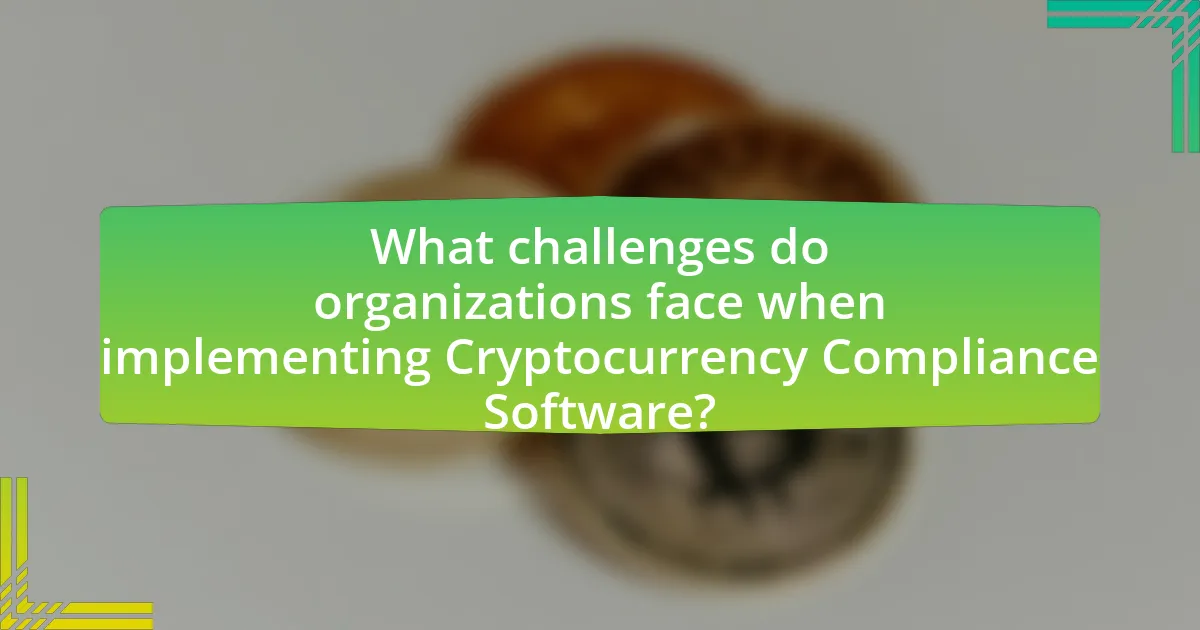Cryptocurrency compliance software is a specialized tool that assists businesses in the cryptocurrency sector in adhering to regulatory requirements and anti-money laundering (AML) laws. The article explores the functionality, key features, and benefits of such software, emphasizing its role in automating compliance processes, enhancing operational efficiency, and mitigating risks associated with financial crimes. It also addresses the challenges organizations face during implementation, the importance of training, and future trends in compliance technology, including the integration of artificial intelligence. As regulatory scrutiny intensifies, the necessity for effective compliance measures in the cryptocurrency industry becomes increasingly critical.

What is Cryptocurrency Compliance Software?
Cryptocurrency compliance software is a specialized tool designed to help businesses in the cryptocurrency sector adhere to regulatory requirements and anti-money laundering (AML) laws. This software typically includes features such as transaction monitoring, customer due diligence, and reporting capabilities to ensure compliance with local and international regulations. The necessity of such software is underscored by the increasing scrutiny from regulatory bodies, with a report from Chainalysis indicating that over $10 billion in cryptocurrency was laundered in 2020, highlighting the critical need for effective compliance measures in the industry.
How does Cryptocurrency Compliance Software function?
Cryptocurrency compliance software functions by automating the processes required to ensure that cryptocurrency transactions adhere to regulatory standards. This software typically integrates features such as Know Your Customer (KYC) verification, Anti-Money Laundering (AML) monitoring, and transaction tracking to identify suspicious activities. For instance, KYC processes involve collecting and verifying user identities to prevent fraud, while AML features analyze transaction patterns to detect potential money laundering activities. The effectiveness of this software is supported by the increasing regulatory scrutiny in the cryptocurrency space, with jurisdictions worldwide implementing stricter compliance requirements to combat financial crime.
What are the key features of Cryptocurrency Compliance Software?
Cryptocurrency Compliance Software typically includes features such as transaction monitoring, KYC (Know Your Customer) verification, AML (Anti-Money Laundering) compliance, and reporting capabilities. Transaction monitoring allows for real-time analysis of transactions to detect suspicious activities, while KYC verification ensures that users’ identities are validated according to regulatory standards. AML compliance features help organizations adhere to laws designed to prevent money laundering, and robust reporting capabilities facilitate the generation of necessary documentation for regulatory authorities. These features are essential for businesses operating in the cryptocurrency space to mitigate risks and ensure adherence to legal requirements.
How does Cryptocurrency Compliance Software integrate with existing systems?
Cryptocurrency compliance software integrates with existing systems through APIs and data exchange protocols that facilitate seamless communication between platforms. This integration allows for real-time monitoring of transactions, automated reporting, and compliance checks, ensuring that organizations adhere to regulatory requirements. For instance, many compliance solutions can connect with blockchain networks and financial systems to gather transaction data, analyze it for suspicious activity, and generate compliance reports, thereby enhancing operational efficiency and reducing the risk of non-compliance.
Why is Cryptocurrency Compliance Software becoming essential?
Cryptocurrency compliance software is becoming essential due to increasing regulatory scrutiny and the need for businesses to adhere to anti-money laundering (AML) and know your customer (KYC) regulations. As governments worldwide implement stricter regulations to combat financial crimes, companies operating in the cryptocurrency space must ensure they are compliant to avoid hefty fines and legal repercussions. For instance, the Financial Action Task Force (FATF) has set guidelines that require cryptocurrency exchanges to implement robust compliance measures, which has led to a surge in demand for specialized software solutions that can automate and streamline these processes.
What regulatory challenges are driving the need for compliance software?
Regulatory challenges driving the need for compliance software include increasing scrutiny from government agencies, evolving regulations, and the complexity of compliance requirements in the cryptocurrency sector. Government agencies, such as the Financial Crimes Enforcement Network (FinCEN) and the Securities and Exchange Commission (SEC), have implemented stricter regulations to combat money laundering and fraud, necessitating robust compliance measures. Additionally, the rapid evolution of regulations, such as the European Union’s Fifth Anti-Money Laundering Directive (5AMLD), requires businesses to adapt quickly, making compliance software essential for tracking and managing these changes effectively. The complexity of compliance requirements, which often involve multiple jurisdictions and varying standards, further underscores the necessity for automated solutions that can streamline processes and ensure adherence to legal obligations.
How does Cryptocurrency Compliance Software help mitigate risks?
Cryptocurrency compliance software helps mitigate risks by automating the monitoring and reporting of transactions to ensure adherence to regulatory standards. This software analyzes transaction patterns, identifies suspicious activities, and generates compliance reports, which reduces the likelihood of financial crimes such as money laundering and fraud. According to a report by Chainalysis, firms using compliance software can decrease their risk exposure by up to 50% through enhanced transaction monitoring and real-time alerts.

What are the benefits of using Cryptocurrency Compliance Software?
Cryptocurrency compliance software enhances regulatory adherence for businesses operating in the digital currency space. This software automates the monitoring of transactions, ensuring that they comply with Anti-Money Laundering (AML) and Know Your Customer (KYC) regulations. By utilizing such software, companies can significantly reduce the risk of legal penalties, as it provides real-time alerts for suspicious activities, thereby facilitating timely reporting to authorities. Furthermore, the software often includes features for comprehensive record-keeping, which is essential for audits and regulatory reviews. According to a report by Chainalysis, firms that implement compliance measures can improve their operational efficiency and build trust with customers, ultimately leading to increased market competitiveness.
How does Cryptocurrency Compliance Software enhance operational efficiency?
Cryptocurrency Compliance Software enhances operational efficiency by automating regulatory processes and reducing manual workload. This software streamlines tasks such as transaction monitoring, customer due diligence, and reporting, which traditionally require significant human resources and time. For instance, a study by Chainalysis found that automated compliance solutions can reduce the time spent on compliance tasks by up to 70%, allowing organizations to allocate resources more effectively. Additionally, real-time data analysis provided by this software helps organizations quickly adapt to changing regulations, ensuring ongoing compliance and minimizing the risk of costly penalties.
What time-saving features does Cryptocurrency Compliance Software offer?
Cryptocurrency Compliance Software offers several time-saving features, including automated transaction monitoring, real-time risk assessment, and streamlined reporting processes. Automated transaction monitoring allows organizations to continuously track and analyze transactions for compliance with regulations, significantly reducing the manual effort required. Real-time risk assessment tools enable businesses to quickly identify and mitigate potential compliance risks, enhancing operational efficiency. Additionally, streamlined reporting processes simplify the generation of compliance reports, saving time and resources that would otherwise be spent on manual data compilation and analysis. These features collectively enhance productivity and ensure adherence to regulatory requirements without the burden of extensive manual oversight.
How does it improve accuracy in compliance reporting?
Cryptocurrency compliance software improves accuracy in compliance reporting by automating data collection and analysis, which reduces human error. This software utilizes algorithms to track transactions in real-time, ensuring that all relevant data is captured and reported accurately. For instance, a study by Chainalysis found that automated compliance processes can reduce reporting errors by up to 90%, highlighting the effectiveness of technology in enhancing accuracy.
What cost implications are associated with Cryptocurrency Compliance Software?
Cryptocurrency compliance software incurs several cost implications, including initial setup costs, ongoing subscription fees, and potential costs for updates and maintenance. The initial setup costs can range from a few thousand to tens of thousands of dollars, depending on the complexity of the software and the specific needs of the organization. Ongoing subscription fees typically range from hundreds to thousands of dollars per month, depending on the features and level of service provided. Additionally, organizations may face costs related to training staff on the software and integrating it with existing systems. According to a report by Chainalysis, compliance-related costs can represent a significant portion of operational expenses for cryptocurrency firms, emphasizing the financial impact of adopting such software.
How does investing in compliance software save money in the long run?
Investing in compliance software saves money in the long run by reducing the costs associated with regulatory fines and penalties. Organizations that implement compliance software can automate monitoring and reporting processes, which minimizes the risk of non-compliance. For instance, a study by the Ponemon Institute found that companies with automated compliance solutions experienced a 30% reduction in compliance-related costs compared to those relying on manual processes. Additionally, compliance software enhances operational efficiency, allowing businesses to allocate resources more effectively, further contributing to cost savings over time.
What are the potential costs of non-compliance without such software?
The potential costs of non-compliance without cryptocurrency compliance software include significant financial penalties, legal repercussions, and reputational damage. Financial penalties can reach millions of dollars, as seen in cases where companies have faced fines for failing to adhere to anti-money laundering regulations. For instance, in 2021, a cryptocurrency exchange was fined $100 million for non-compliance with regulatory standards. Legal repercussions may involve lawsuits or criminal charges against individuals or organizations, further escalating costs. Additionally, reputational damage can lead to loss of customer trust and decreased market share, which can have long-term financial implications. Overall, the absence of compliance software can result in a combination of immediate and ongoing costs that can severely impact a business’s viability in the cryptocurrency market.

What challenges do organizations face when implementing Cryptocurrency Compliance Software?
Organizations face several challenges when implementing Cryptocurrency Compliance Software, including regulatory uncertainty, integration with existing systems, and the need for specialized expertise. Regulatory uncertainty arises because cryptocurrency regulations vary significantly across jurisdictions, making it difficult for organizations to ensure compliance. Integration challenges occur as organizations must adapt their current systems to work seamlessly with new compliance software, which can be complex and resource-intensive. Additionally, the lack of specialized expertise in cryptocurrency compliance can hinder effective implementation, as organizations may struggle to find qualified personnel who understand both the technology and regulatory landscape. These challenges can lead to increased costs and delays in achieving compliance objectives.
What are the common obstacles in adopting compliance software?
Common obstacles in adopting compliance software include high implementation costs, complexity of integration with existing systems, and resistance to change from employees. High implementation costs can deter organizations from investing in compliance software, as they may require significant financial resources for both the software itself and the necessary training. The complexity of integrating compliance software with existing systems can lead to operational disruptions, making organizations hesitant to proceed. Additionally, resistance to change from employees can hinder the adoption process, as staff may be reluctant to adapt to new technologies and workflows. According to a survey by Deloitte, 70% of organizations cite employee resistance as a major barrier to technology adoption, highlighting the importance of addressing this issue for successful implementation.
How can organizations overcome resistance to change?
Organizations can overcome resistance to change by fostering open communication and involving employees in the change process. Engaging employees through transparent discussions about the reasons for change and its benefits can reduce uncertainty and build trust. Research indicates that organizations that actively involve employees in decision-making processes experience a 70% higher success rate in implementing change initiatives. Additionally, providing training and support helps employees adapt to new systems, such as cryptocurrency compliance software, thereby easing the transition and enhancing acceptance.
What training is necessary for effective implementation?
Effective implementation of cryptocurrency compliance software requires training in regulatory frameworks, software functionality, and risk management practices. Training should focus on understanding the specific compliance requirements set by authorities such as the Financial Action Task Force (FATF) and the U.S. Financial Crimes Enforcement Network (FinCEN). Additionally, users must be proficient in navigating the software’s features, including transaction monitoring and reporting tools. Research indicates that organizations that invest in comprehensive training programs see a 30% increase in compliance accuracy and a reduction in regulatory penalties, highlighting the importance of targeted training for effective software implementation.
How can organizations ensure successful integration of Cryptocurrency Compliance Software?
Organizations can ensure successful integration of Cryptocurrency Compliance Software by conducting thorough needs assessments and aligning the software capabilities with regulatory requirements. This alignment is crucial as it allows organizations to identify specific compliance needs, such as KYC (Know Your Customer) and AML (Anti-Money Laundering) regulations, which vary by jurisdiction.
Furthermore, organizations should invest in training staff on the software’s functionalities to maximize its effectiveness. Research indicates that companies that prioritize employee training experience a 20% increase in software utilization rates. Additionally, establishing clear communication channels between compliance teams and IT departments facilitates smoother integration processes, ensuring that technical issues are promptly addressed.
Regularly updating the software to adapt to evolving regulations is also essential, as the cryptocurrency landscape is rapidly changing. According to a report by the Financial Action Task Force, jurisdictions that implement timely updates to compliance software are better positioned to mitigate risks associated with cryptocurrency transactions.
What best practices should be followed during implementation?
During implementation of cryptocurrency compliance software, best practices include thorough planning, stakeholder engagement, and continuous monitoring. Thorough planning ensures that all regulatory requirements are identified and addressed, which is critical given the evolving nature of cryptocurrency regulations. Engaging stakeholders, including legal, compliance, and IT teams, fosters collaboration and ensures that the software meets organizational needs. Continuous monitoring of the software’s performance and regulatory changes is essential to maintain compliance and adapt to new challenges in the cryptocurrency landscape. These practices are supported by industry reports indicating that organizations with structured implementation strategies experience higher compliance success rates.
How can ongoing support and updates be managed effectively?
Ongoing support and updates can be managed effectively by implementing a structured framework that includes regular communication, scheduled maintenance, and user feedback integration. Establishing a dedicated support team ensures that users receive timely assistance, while routine updates can be planned based on user needs and software performance metrics. For instance, a study by the Software Engineering Institute highlights that organizations with a defined update schedule experience 30% fewer issues compared to those without. This structured approach not only enhances user satisfaction but also ensures that the software remains compliant with evolving cryptocurrency regulations.
What are the future trends in Cryptocurrency Compliance Software?
Future trends in Cryptocurrency Compliance Software include increased automation, enhanced regulatory integration, and the use of artificial intelligence for risk assessment. Automation will streamline compliance processes, reducing manual effort and errors, while regulatory integration will ensure that software adapts to evolving legal frameworks across jurisdictions. The application of artificial intelligence will enable more sophisticated analysis of transaction patterns, improving the identification of suspicious activities. According to a report by Chainalysis, the demand for compliance solutions is expected to grow significantly as regulatory scrutiny intensifies, highlighting the necessity for robust compliance tools in the cryptocurrency sector.
How is technology evolving to enhance compliance solutions?
Technology is evolving to enhance compliance solutions through the integration of advanced analytics, artificial intelligence, and blockchain technology. These innovations enable organizations to automate compliance processes, improve data accuracy, and ensure real-time monitoring of transactions. For instance, AI algorithms can analyze vast amounts of data to identify suspicious activities, while blockchain provides a transparent and immutable record of transactions, which is crucial for regulatory audits. According to a report by Deloitte, the use of AI in compliance can reduce costs by up to 30% and improve detection rates of non-compliance issues. This evolution is essential in the context of cryptocurrency, where regulatory requirements are rapidly changing and necessitate robust compliance frameworks.
What role will artificial intelligence play in future compliance software?
Artificial intelligence will play a crucial role in future compliance software by enhancing the efficiency and accuracy of regulatory processes. AI algorithms can analyze vast amounts of data in real-time, identifying patterns and anomalies that may indicate non-compliance or fraudulent activities. For instance, a study by Deloitte highlights that AI can reduce compliance costs by up to 30% through automation of routine tasks and improved risk assessment capabilities. This integration of AI will enable organizations to adapt quickly to changing regulations and maintain compliance in the rapidly evolving cryptocurrency landscape.
What practical tips can organizations follow when choosing Cryptocurrency Compliance Software?
Organizations should prioritize software that offers robust regulatory compliance features, including KYC (Know Your Customer) and AML (Anti-Money Laundering) capabilities. These features are essential for meeting legal requirements and mitigating risks associated with cryptocurrency transactions. Additionally, organizations should evaluate the software’s integration capabilities with existing systems, ensuring seamless data flow and operational efficiency.
Furthermore, organizations must consider the software’s scalability to accommodate future growth and evolving regulatory landscapes. A user-friendly interface is also crucial, as it enhances user adoption and reduces training time. Finally, organizations should assess the vendor’s reputation and customer support, as reliable assistance can significantly impact compliance management.






